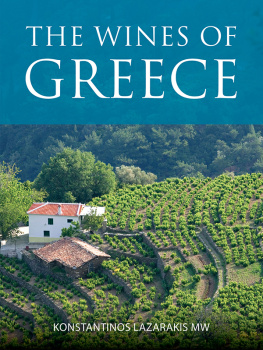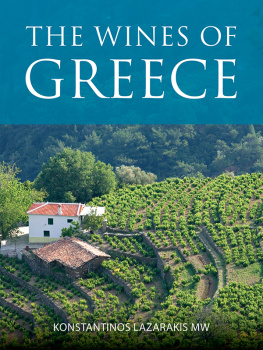This book is a publication of
Indiana University Press
Office of Scholarly Publishing
Herman B Wells Library 350
1320 East 10th Street
Bloomington, Indiana 47405 USA
iupress.indiana.edu
2019 by Konstantinos Kalantzis
All rights reserved
No part of this book may be reproduced or utilized in any form or by any means, electronic or mechanical, including photocopying and recording, or by any information storage and retrieval system, without permission in writing from the publisher. The paper used in this publication meets the minimum requirements of the American National Standard for Information SciencesPermanence of Paper for Printed Library Materials, ANSI Z39.48-1992.
Manufactured in the United States of America
Cataloging information is available from the Library of Congress.
ISBN 978-0-253-03712-1 (hardback)
ISBN 978-0-253-03713-8 (paperback)
ISBN 978-0-253-03714-5 (ebook)
1 2 3 4 5 24 23 22 21 20 19
Note about the cover image: A copy of a photograph taken around 1939 by professional photographer Nelly, working under commission from the Metaxas regimes Under-Ministry for Press and Tourism, rests on an artisans workbench in highland Sfakia. This image was taken during one of many discussions I had with my interlocutors around archival photographs that I brought to the field. Such historical portraits are rare and are highly prized by Sfakiansespecially the sitters descendants, though viewers often deconstruct the photographers staging of their forebears. Sfakians who examine such images are primarily concerned with identifying and naming the subjects, who tend to go unnamed in archives and published books, and they also comment on sitters life histories and local reputations. My interlocutors couldnt identify the men in this particular historical image though they speculated about their names. Workbench photo by the author, 2012; historical photo by Nelly, ca. 1939, copyright Benaki Museum Photographic Archive.
T HIS BOOK IS THE CULMINATION OF MORE THAN a decade of research in and on Sfakia, and many people have left their marks on its pages. I embarked on this work while pursuing my doctoral degree, during which time I benefited enormously from the guidance of Chris Pinney and Charles Stewart, my academic supervisors in the Department of Anthropology at University College London. I am deeply grateful to Chris for his tremendous inspiration and exhaustive support and to Charles for his meticulous and creative advice. I am also very thankful to the late Peter Loizos, Elizabeth Edwards, Rene Hirschon, Marcus Banks, Chris Tilley, Allen Abramson, and Martin Holbraad for constructive criticism and intellectual stimulation during that period. In Greece, my work profited from productive discussions during workshops for doctoral students at the University of the Aegean Department of Anthropology and at the University of Crete Department of History and Archaeology. I thank the organizers of and participants in those events, among others, Akis Papataxiarchis, Theodoros Paradellis, Panos Panopoulos, Venetia Kantza, Christos Hadjiiosif, Sokratis Petmezas, Efi Avdela, Giannis Kokkinakis, and Aglaia Kasdagli.
I am grateful to the Arts and Humanities Research Council, the University College London Research Project Fund, and the University of London Central Research Fund for financially assisting me in my research. I also gratefully acknowledge a 20112012 Mary Seeger OBoyle Post-Doctoral Research Fellowship at the Center for Hellenic Studies, Princeton University for providing support for writing and thinking through the issues this book explores. Special thanks go to Dimitri Gondicas and other members of the centers staff for creating a hospitable and stimulating environment. At Princeton, I also benefited from insightful feedback from and discussions with Carol Greenhouse, John Borneman, and Lisa Davis. For support during manuscript preparation, I am also grateful to the PhotoDemos project, which has received funding from the European Research Council (ERC) under the European Unions Horizon 2020 research and innovation program (grant agreement No 695283).
I was able to think through some of the ideas presented in these pages while teaching at San Francisco State University and the University of Bern. I am particularly grateful for thoughtful comments from and discussions with students, colleagues Alexandra Pappas, David Leitao, Michaela Schuble, and Stanley Brandes, and interlocutors at public talks I gave in spring 2016 and winter 2017.
Throughout the years, I have received fruitful feedback while presenting my research in various venues, and I would like to thank convenors and commentators, including Eleana Yalouri, Vangelis Calotychos, Alexandra Bakalaki, Elsa Amanatidou, Aimee Places, Elpida Rikou, Othon Alexandrakis, Heath Cabot, Noelle Mol, Neni Panourgi, Dimitra Madianou, Vassiliki Yiakoumaki, Kerstin Poehls, Ritsa Deltsou, Foteini Tsimpiridou, Sissy Theodosiou, and Elia Vardaki. I have also had the opportunity to rework some of my ideas through collaboration with the editors of a number of scholarly publications. For their valuable advice, I thank Gustaaf Houtman, Angelique Haugerud, Yannis Hamilakis, Eleni Papargyriou, Philip Carabott, Andrew Shryock, David Akin, Jenny Chio, and Mark Westmoreland. I am grateful to my UCL colleagues Chris Pinney, Naluwembe Binaisa, Ileana Selejan, Vindhya Buthpitiya, and Sokphea Young, collaborators in the PhotoDemos project, for facilitating a realm of exciting explorations of photography and the social.
Many friends and colleagues in Athens and Crete have offered intellectual support and stimulation as well as warm friendship. I am particularly thankful to Meni Galeridi, Alexandra Bakalaki, Giannis and Stefanos Vamiedakis, Panos Panopoulos, Rania Astrinaki, Vassiliki Yiakoumaki, Iris Tzachili, Eleana Yalouri, Giorgis Nikolakakis, Kostas Gounis, Stamos and Kostas Sinioris, Kostas Chritis, Kostas Spiggos, Leo Seelig, Kostas Strevlos, Leonidas Papafotiou, Giorgos Papachristos, Giorgos Samantas, Dimitris Lykakis, Agis Metaxopoulos, Iosif Tsiamoglou, Nikos Meidanis, Pafsanias Karathanasis, Andreas Anastasiou, Kostis Kornetis, Pavlos Vassilopoulos, Anastasia Ntini, and Zaharias Sifakis. For recommendations, advice, and other help either with fieldwork or during manuscript preparation I am grateful to Eftihis Tzirtzilakis, Giorgos Patroudakis, Zacharenia Simandiraki, Katerina Zacharia, and Mylene Hengen. Kostas Chritis deserves special mention for designing the books maps and creating the image collages, following our long conversation and collaboration. I owe an everlasting debt to Nikos Katsanevas, who acted with immense courage to help me through a serious accident I suffered in 2007.
Special thanks go to Michael Herzfeld for his deeply insightful and critical reading of my previous written work on Sfakia as well as for his warm interest in this project and his help and generosity throughout. For enabling access to the Benaki Museum Photographic Archive and graciously fielding my inquiries about it, I am indebted to Aliki Tsirgialou and other members of the archive staff. Jennika Baines at Indiana University Press oversaw production of the book and offered valuable advice throughout the process. The work benefited from rich commentary offered by two anonymous readers, to whom I am grateful. Linda Formans sharp and meticulous copyediting helped create a better manuscript, for which I am thankful. Kate Schramm at IUP kindly helped me with issues related to the use of images in the book. Segments of draws on my 2016 article Proxy Brigands and Tourists: Visualizing the Greek-German Front in the Debt Crisis,








